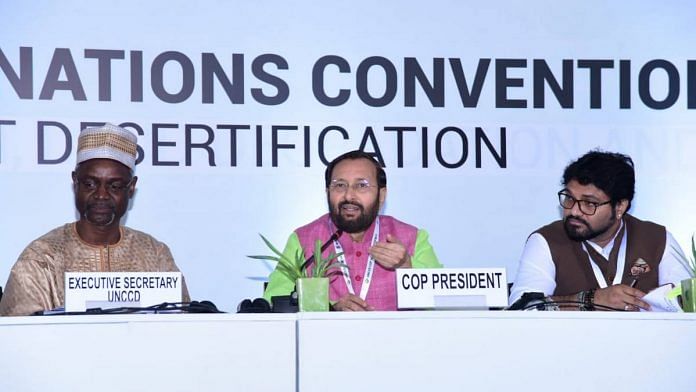New Delhi: Increasing population and depleting quality of lands lead to competition for land resources causing conflicts among communities, said United Nations Under-Secretary-General Ibrahim Thiaw, stressing on the need to combat desertification to maintain global peace.
Thiaw was speaking at the inaugural session of the 14th session of the Conference of Parties (COP-14) to the United Nations Convention to Combat Desertification (UNCCD) in Greater Noida Monday. Union Environment Minister Prakash Javadekar was present at the event.
Thiaw, who is also serving as the Executive Secretary of the UNCCD, said the demand for land resources is also growing with increasing population.
“However, the availability of these resources is shrinking due to climate change and land degradation. This leads to conflicts and competition for land and water throughout the world. That competition can be observed locally or it can have a global dimension. Therefore, land restoration is also a contributor to peace and security in the world,” he said.
‘A conflict of land and water became an ethnic conflict’
Thiaw said, “The connection between land and security may not be very clear to many, but I come from that part of the world where land and security issues are becoming extremely explosive.”
In some parts of the continent where land resources are scarce, the competition has transformed into a conflict, he said.
Giving the example of Africa, which is now home to over 1.1 billion people, Thiaw said: “There are a lot of conflicts between farming communities and those raising livestock. These communities were not from the same tribe, so a conflict of land and water became an ethnic conflict.”
The under-secretary-general urged world leaders to not look at land restoration as only a “biophysical aspect”.
“You are doing it to respond to the needs of the communities. In most cases, you will see the correlation between land degradation and poverty. The poorest people are found in land that is degraded, because rich people go elsewhere,” he added.
Also read: Amazon forest is reaching its tipping point, world needs to scale solutions
‘Land transformation is putting species at risk of extinction’
At the inaugural session, Javadekar blamed human activities — be it climate change, desertification or biodiversity destruction — for disturbing the balance of nature.
“Now, positive human actions can undo that and will make a better world for future generations,” Javadekar told the gathering.
Meanwhile, the United Nations, in a statement, stated that though land transformation is important, it is also putting species at risk of extinction.
“Over 70 per cent of the world’s land area has been transformed from its natural state to produce food, fibre and energy. Some of this conversion is essential, but what is alarming is the pace of land transformation that is putting one million species at risk of extinction,” the statement read.
Moreover, 1 out of 4 hectares of this converted land is no longer usable due to unsustainable land management practices, it stated.
In this context, it is important to note that India has pledged to restore 50 lakh hectares of degraded or barren land for cultivation by 2030. Javadekar had earlier said this target is over and above India’s pledge to restore 13 million hectares of degraded land by 2020.
‘Largest-ever participation’
With over 7,300 registered participation on the first day of the 12-day convention, Thiaw said, the event may be the largest-ever UNCCD COP.
Over the next few days, the convention will see Indian and foreign delegates take 30 decisions aimed at strengthening land-use policies worldwide and addressing emerging threats such as forced migration, sand and dust storms, and droughts.
Prime Minister Narendra Modi will inaugurate a high-level session on 9 September.
Also read: This is how Cape Town averted a water crisis, just days before running dry



